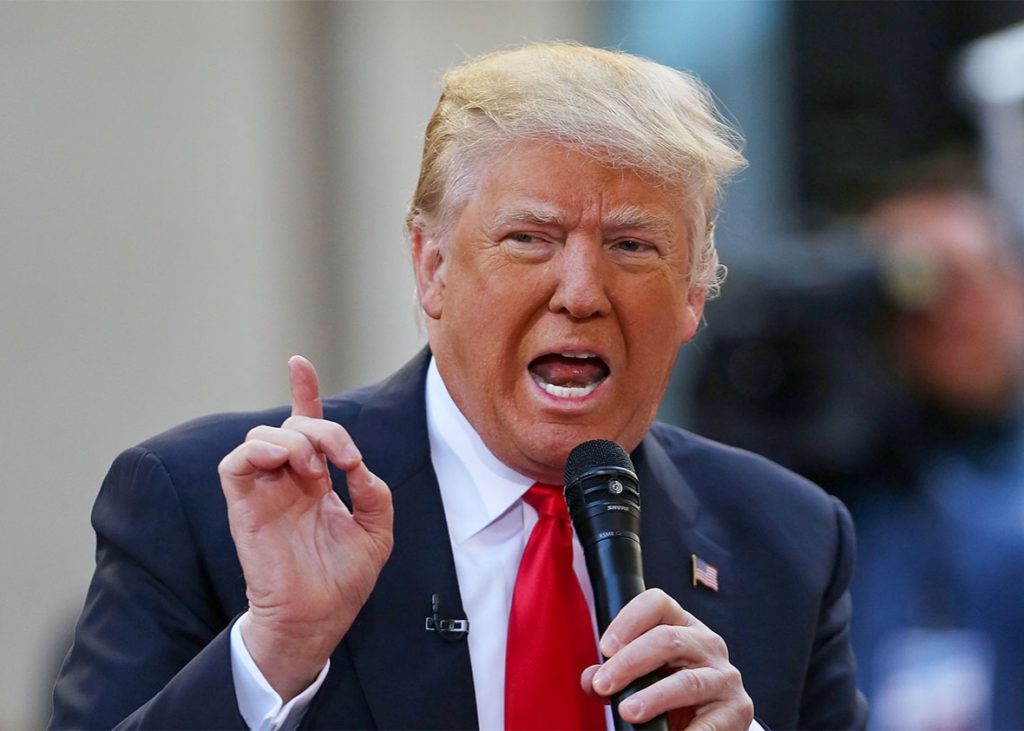November 19, 2021

A new book about the Trump presidency says Christopher Miller, the acting defense secretary at the end of Trump’s term, dissuaded the president from attacking Iran by acting like a “f***** madman.”

Jonathan Karl’s book, “Betrayal: The Final Act of the Trump Show,” released November 16, describes a November 12, 2020, meeting, shortly after the disputed November 3 election, when Miller talked with Trump about a response to an International Atomic Energy Agency report. The IAEA concluded Iran had increased its stockpile of enriched uranium to the point where it could make enough weapons-grade uranium for two bombs within six months.
Trump turned to Miller, according to Karl’s book, and asked if Iran’s nuclear sites could be taken out from the air. “Yes, Mr. President,” replied Miller. “We can absolutely do that.”
But he said 100 manned flights would be needed, given Iran’s air defenses, and “three, four or six planes” would probably be shot down. “I just want to make sure you are comfortable with that.” Trump was worried about things going wrong, especially Boeing’s involvement in air-to-air refueling as “they can’t build s**t anymore.”
“I would play the f***ing madman,” Miller told Karl. “And everybody else would be like, ‘All right, he’s the new guy. He’s fucking insane…. I have found oftentimes, with provocative people, if you get more provocative than them, they then have to dial it down. They’re like, ‘Yeah, I was f***ing crazy,’ but that guy is bats**t.”
The Trump emerging in Karl’s account is unpredictable and ignorant – but a man consistently skeptical of force and committed to withdrawing US troops from foreign theaters, an aim more in common among the left of the Democratic Party than among right-wing Republicans.
An article in The New York Times in September 2019 analyzed Trump’s June 20 decision that year not to retaliate against Iran for shooting down a US surveillance drone. With ships aiming Tomahawk missiles, jets in the sky, and 10,000 sailors and airmen mobilized, Trump called off strikes he had approved hours earlier with 10 minutes to go after being told 150 Iranians would die.
The Times argued that the “about-face, so typically impulsive, instinctive and removed from any process” was a turning point in Trump’s presidency, one that “was taken by Iran as a sign of weakness, emboldening it to attack” Saudi oil facilities in September 2019.
Trump’s response to that attack – in which Iran denied involvement – was just to tighten financial sanctions.
Even before that Saudi attack, the Times said that “as eager as he is to fight with 280 characters on Twitter, Mr. Trump has proved profoundly reluctant to fight with live ammunition on a real battlefield.” The paper highlighted the influence on Trump of Fox News, especially presenter Tucker Carlson, always keen to remind the president he had been elected to stop wars, not start them.
In a meeting in Congress over the drone shootdown, Trump, according to The New York Times piece, “rambled on about how bad Mr. Obama’s deal [the 2015 nuclear agreement] had been and insisted over and over again … that his pressure campaign would force Iran to the bargaining table. He seemed less certain about what to do in response to the drone shootdown.”
The picture emerging from Karl’s book essentially confirms the Times’ portrayal. Trump essentially repeated a mistake made by Barack Obama in failing to act in 2013 when Syrian President Bashar al-Assad crossed a “red line” announced by Obama over the use of chemical weapons.
“Trump is in a box of his own making,” Philip Gordon, a Middle East adviser to Obama, told the Times in 2019. “He has put in place policies … guaranteed to provoke an aggressive Iranian response, but he’s not prepared to respond aggressively in turn, and the Iranians know it.”















